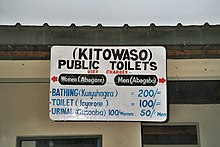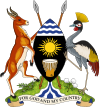Languages of Uganda
{Ennimi za Uganda
| butongole = Olungereza ne Oluswayili
| Buwangwa = Luganda
| akabonero = Olulimi Olw'obubonero Olwa Uganda
|nnono=
|entono= enyinji Bantu ne nnimi za Nilo Sahara; Olunubi
|olutali lutongole=Oluluwo lwa Maserengeta, Lugubara, Lunyankole, Lusoga, Luteso
|butaka=Luganda, Olungereza lwa Uganda
| keyboard = QWERTY|keyboard image= |image=Hotel Kolping en Masindi (Uganda) 20190916 064404.jpg
|caption=Akabonero k'okulabula mu Luganda, Lungereza ne Luswayili
}}[[Kifananyi:Ennimi za Uganda.png|kyenkumu|324x324px|Famile z'ennimi maapu ya Uganda]]
|image=Hotel Kolping en Masindi (Uganda) 20190916 064404.jpg
|caption=Akabonero k'okulabula mu Luganda, Lungereza ne Luswayili
}}[[Kifananyi:Ennimi za Uganda.png|kyenkumu|324x324px|Famile z'ennimi maapu ya Uganda]]
Mu Uganda olulimi olusinga okwogerwa mu kibuga ekikulu lwe Luganda, lugobererwa na Lungereza (era olulimi olutongole okuva 1962), nga amasomero gonna mu Uganda galukozesa mu misomo jaago olw'ennyanjula y'Olungereza mu kiseera ky'obufuzi bw'amatwaale. Olungereza era lulimi lwa busuubuzi n'ensonga z'ekkooti.[1] Olusinga okwogerwa oluvannyuma lw'Oluganda n'Olungereza lwe Luswayili.[1] Olulimi luno lwa bulijjo nnyo mu balirwaana Kenya ne Tanzania. Oluswayili lusomesebwa mu masomero nga olulimi olwokulondako oluyungibwa era lusinga kwogerwa n'ejje lya Uganda. Mu 2005, waliwo ejogera okusaa Oluswayili nga olulimi olwokubiri olutongole nga lwali lulabwa nga nampawengwa, wadde kino tekinnaba kukakasibwa ne gavumenti.[1] Oluswayili lukozesebwa wakati mu bitundu ebirinaanye Sudan Maserengeta ne Kenya.[2]
Uganda lye ggwanga lya nnimi nyinji n'okusukka ennimi ezibalirirwa 70 okutwaliza awamu ezogerwa. 43 ku nnimi ze ennamu[3] zigwa mu famile nnya enkulu—Bantu, Nayilotiki, Sudan ya Masekkati ne Kuliak. Wakati wa zino, 41 za nnono ne 2 si za nnono. Okusingawo, 5 za ttendekero, 27 za kukulakulanya, 7 za tandikibwawo, 2 za buzibu buzibu, ne 2 kumpi za nsirise. Waliwo era Olulimi Olw'obubonero Olulimi Olw'obubonero Olwa Uganda.
Languages
[edit]
In all of the Bantu-speaking areas of Uganda, dialect continua are very common. For example, people around Mbarara speak Runyankore and people from Tooro Kingdom speak Rutooro, but in between those areas there are villages where most of the people speak a dialect that is best characterised as intermediate between Runyankore and Rutooro. In fact, prior to 1952, these and other closely related dialects had a shared literature under the name of Runyoro (Runyoro, Rutooro, Runyankore, Rukiga, Ruhema, Runyambo, Ruhaya) since they are all mutually intelligible. In 1952, however, separate orthographies were developed for Runyoro and Rutooro (Runyoro–Rutooro) and for Runyankore and Rukiga (Runyankore–Rukiga). Around 1990 the term Runyakitara, which is not attached to any modern ethnic group but to the cultural heirs of the Empire of Kitara, was popularised to refer to the whole language cluster as well as to facilitate work in these languages, such as teaching at university level (Makerere). Nevertheless, a unified orthography is yet to be developed and spread.[citation needed]
In south-central Uganda, the Bantu languages of Luganda and Lusoga are largely interintelligible as well. This dialectic similarity also extends to the Lussese language spoken in the Ssese Islands of Lake Victoria.[4]
Nilotic languages include Karamojong of eastern Uganda (population 370,000), the Kakwa language in the extreme northwestern corner (about 150,000 population) and Teso south of Lake Kyoga (3.2 million 9.6% of Uganda's population). Western Nilotic Luo languages include Alur (population 459,000), Acholi, Lango, Adhola and Kumam.
Some Southern Nilotic Kalenjin languages are spoken along the border with Kenya, including Pökoot and the Elgon languages near Kupsabiny. Kuliak languages Ik and Soo are spoken in northeast Uganda. Lugbara, Aringa, Ma'di and Ndo of northwestern Uganda are members of the Central Sudanic languages.
Language policy
[edit]In Uganda, as in many African countries, English was introduced in government and public life by way of missionary work and the educational system. During the first decades of the twentieth century, Swahili gained influence as it was not only used in the army and the police, but was also taught in schools. The Baganda viewed the introduction of Swahili as a threat to their political power and partly through their influence, English remained the only official language at that time.[citation needed]
After independence, there were efforts to choose an African official language, with Swahili and Luganda as the most considered candidates. Although Luganda was the most geographically spread language, people outside Buganda were opposed to having it as a national language.[5] English remained the official language.[6]
Ugandan English, a local dialect of English, is largely influenced by native languages of the Ugandan people but very similar to both the British and American English.
Uganda National Kiswahili Council
[edit]In 2011, the government of Uganda revealed plans to establish a Swahili language council to boost the teaching of the Swahili language in the country. It was not until September 9, 2019 that the cabinet passed resolution to create the National Kiswahili Council.[7]
The National Swahili Council is meant to guide the planning process, implementation of interventions and allocation of resources to the usage and development of Kiswahili as a lingua franca – a language that is adopted as a common language between speakers whose first languages are different.
References
[edit]- ^ a b c Nakayiza, Judith; Ssentanda, Medadi. "Olungereza lufuge mu Uganda, naye ennimi z'ennono teziteekwa mabbali". The Conversation. Retrieved 2022-05-14.
- ^ "Uganda". World Directory of Minorities and Indigenous Peoples.
- ^ Ethnologue, "Ennimi za Uganda" (enkalala era 2 ennimi n'awatali bogezi, Luswayili, n'olulimi lwa Uganda Olw'obubonero olw'omugatte gwa 45)
- ^ Alexandra Aikhenvald; Anne Storch, eds. (22 January 2013). Perception and Cognition in Language and Culture. Koninklijke Brill NV. p. 252. ISBN 978-90-04-23367-6. Retrieved 22 December 2013.
- ^ Ladefoged et al., 1972:28-30
- ^ Mpuga 2003
- ^ URN. "Ugandans must prepare to learn, speak Kiswahili - Ofwono". The Observer - Uganda. Retrieved 2020-06-12.
Further reading
[edit]- Gordon, Raymond G., Jr. (ed.), 2005. Ethnologue: Languages of the World, Fifteenth edition. Dallas, Tex.: SIL International. Online version: http://www.ethnologue.com/. More specifically Ethnologue report for Uganda, retrieved August 19, 2005.
- Ladefoged, Peter; Ruth Glick; Clive Criper; Clifford H. Prator; Livingstone Walusimbi (1972) Language in Uganda (Ford Foundation language surveys vol. 1). London/New York etc. Oxford University Press. ISBN 0-19-436101-2
- Mpuga, Douglas (2003) 'The official language issue: A look at the Uganda Experience'. Unpublished paper presented at the African Language Research Project Summer Conference, Maryland.
- Parry, Kate (ed.) (2000) Language and literacy in Uganda: towards a sustainable reading culture. Kampala: Fountain Publishers.


